Soy Milk Formula Singapore 2023
Soy formulas are made with soy, it means they contain soy protein. These formulae are marketed to people with lactose intolerance and galactosemia, both of which are uncommon in babies. In soy formula, the term “soy protein isolate” may appear on the ingredient list. These are the standard formulations, which include full-size soy proteins.
Is Soy Milk Formula Good for Babies?
Soy formula is likely safe for most healthy babies. It's a great choice for vegan families. However, best to consult a doctor, especially if your baby has medical condition.
Soy Milk Pros & Cons
3. Soy for Cow's Milk Allergy
Soy Milk Pros & Cons
1. Soy for Lactose Intolerance
For babies with lactose sensitivity, soy formulas are frequently advised. Lactose intolerance happens when your baby is unable to digest naturally occurring sugars in cow’s milk that might cause extreme irritability and gastrointestinal side effects such as diarrhea.
2. Nutrients in Soy Milk
2. Nutrients in Soy Milk
Soy milk is fortified with some of the same micronutrients found in cow's milk - such as calcium, vitamin D, riboflavin, phosphorous, vitamin A, and vitamin B-12. Soy milk also has comparable amount of protein as cow's milk, but with very little saturated fat and no cholesterol.
3. Soy for Cow's Milk Allergy
Soy-protein formulas are widely used for feeding children with CMA. Cow's milk allergy is an adverse immune response associated with a clinical reaction due to the binding of specific immunoglobulin (IgE) to antigens/proteins in cow's milk (IgE), which could induce an allergic reaction in sensitized individuals. It is the most common type of food allergy, affecting <2% of children under 4 years of age (Source)
However, best consult a doctor first before taking soy formula because some infants with cow’s milk allergy also react to soy.
4. Long-Term Health Considerations
However, best consult a doctor first before taking soy formula because some infants with cow’s milk allergy also react to soy.
4. Long-Term Health Considerations
Although a few studies on the safety of soy in young children have been conducted, but long-term safety data are very limited. Furthermore, the protein may cause stomach pain, diarrhea, and a lack of bowel motions, among other things.
Because of the safety concerns around soy, pediatricians usually only recommend it for babies with medical issue or for cultural / religious reasons.
Most infant formula-fed newborns will feed 8 to 12 times in 24 hours. Talk with your child’s doctor or nurse about how much infant formula is right for your baby. (Source)
- Extra Fussiness Following Feedings
- Bloody Stool
- Severe Constipation
- Allergy Symptoms. They can show symptoms either immediately following feeding or up to 10 days later. For instance: eczema or skin rashes, loose stools (which may contain blood), vomiting or gagging, refusing bottles, wheezing, swelling, hives.
c. Goat Milk Formula
Goat Milk formula may be a better formula for children with constipation; this is because goat formula contains high levels of prebiotic oligosaccharides.
Because of the safety concerns around soy, pediatricians usually only recommend it for babies with medical issue or for cultural / religious reasons.
Best Soy Milk Formula Singapore
A. Soy Milk Formula for 0-12 months
3. Enfamil A+ Stage 1 Soy Infant Formula Baby Milk Powder4. Gerber, Good Start, Soy Based Powder Infant Formula
6. Isomil ® Stage 3 Soy Growing-Up Formula
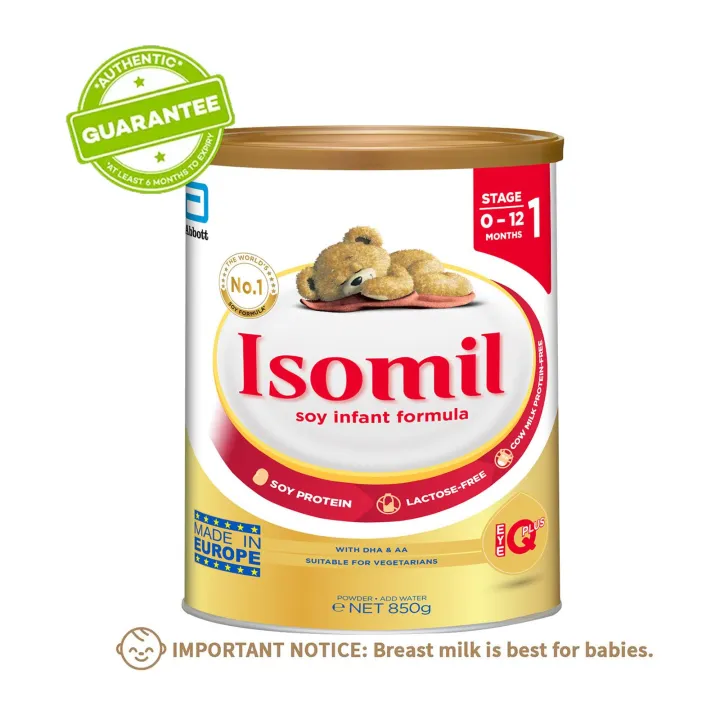
- A soy infant formula for infants aged 0 to 6 months.
- It includes nutrients such as Lutein, DHA and AA.
- The formula is Lactose Free and Cow Milk Protein Free and suitable for Vegetarians.
- It is also palm oil-free, scientifically formulated for nutrient absorption.
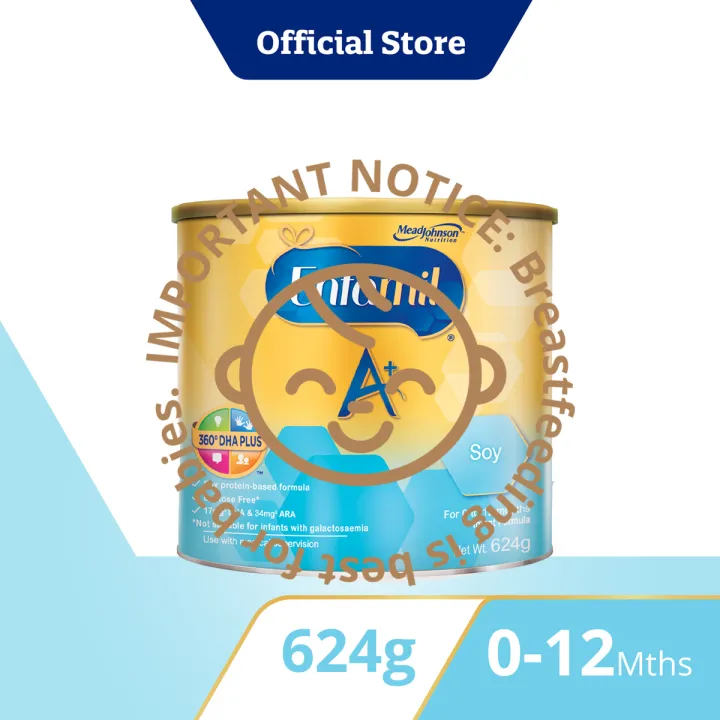
Enfamil A+ Soy contains:
- Soy protein-based formula
- Lactose Free*
- 17mgΔ DHA & 34mgΔ ARA
6. Isomil ® Stage 3 Soy Growing-Up Formula 850g (1-10 years)
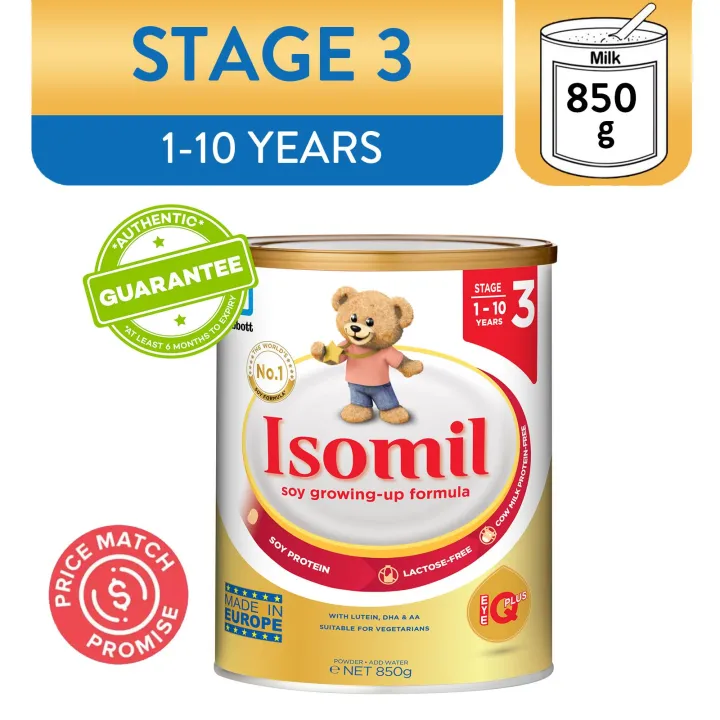
Isomil Stage 3 Soy Growing-Up Formula contains Advance Eye Q-Plus system of nutrients to support brain, eye and physical development, Immunity ingredients to support a healthy digestive system and cell function, and ProCalci Formulation fortified with calcium for development of strong bones and teeth.
- Suitable for 12 months and above
B. Soy Milk Formula for 1 Year above
5. Dumex Mamil Gold Soy (1 Year Onwards) Baby Formula6. Isomil ® Stage 3 Soy Growing-Up Formula
A. Soy Milk Formula For 0-12 months
1. Isomil ® Stage 1 Soy Growing-Up Formula 850g (0-12 months)

- A soy infant formula for infants aged 0 to 6 months.
- It includes nutrients such as Lutein, DHA and AA.
- The formula is Lactose Free and Cow Milk Protein Free and suitable for Vegetarians.
- It is also palm oil-free, scientifically formulated for nutrient absorption.
Price on Lazada: SGD 55.45 > Buy on Lazada
2. Dumex Mamil Gold Soy Infant Formula Stage 1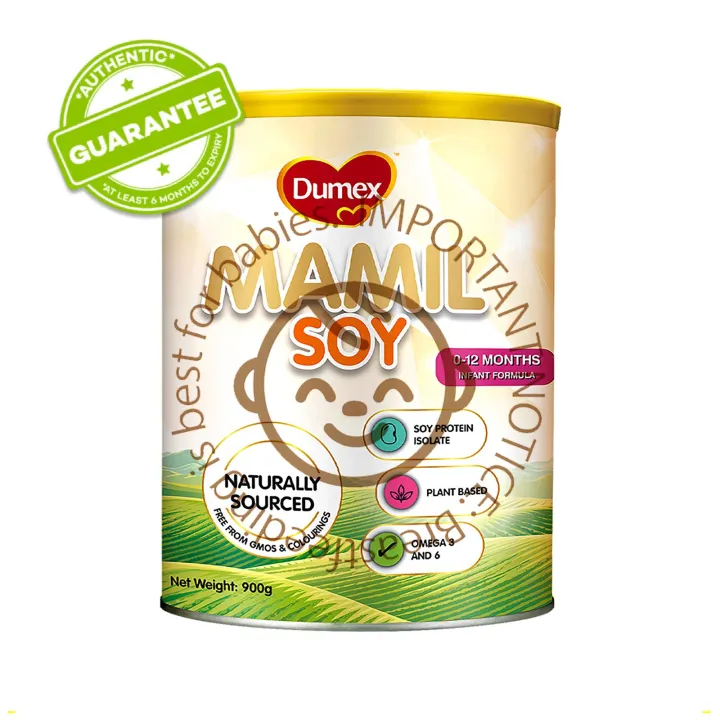 A complete soy infant formula containing USA soy protein isolate to support overall growth and development for babies aged 0-12months. It may be recommended by doctors during lactose intolerance and cow's milk protein sensitivity, use with medical supervision.
A complete soy infant formula containing USA soy protein isolate to support overall growth and development for babies aged 0-12months. It may be recommended by doctors during lactose intolerance and cow's milk protein sensitivity, use with medical supervision.
Dumex Mamil® Soy is free from genetically modified organisms (GMOs) and colourings and is an alternative for babies who preferred a diet without lactose and cow’s milk protein or on a vegan diet.

Dumex Mamil® Soy is free from genetically modified organisms (GMOs) and colourings and is an alternative for babies who preferred a diet without lactose and cow’s milk protein or on a vegan diet.
Price on Lazada: SGD 53.00 > Buy on Lazada
3. Enfamil A+ Stage 1 Soy Infant Formula Baby Milk Powder

Enfamil A+ Soy contains:
- Soy protein-based formula
- Lactose Free*
- 17mgΔ DHA & 34mgΔ ARA
- Suitable for 0-12 months
*Not suitable for infants with galactosaemia
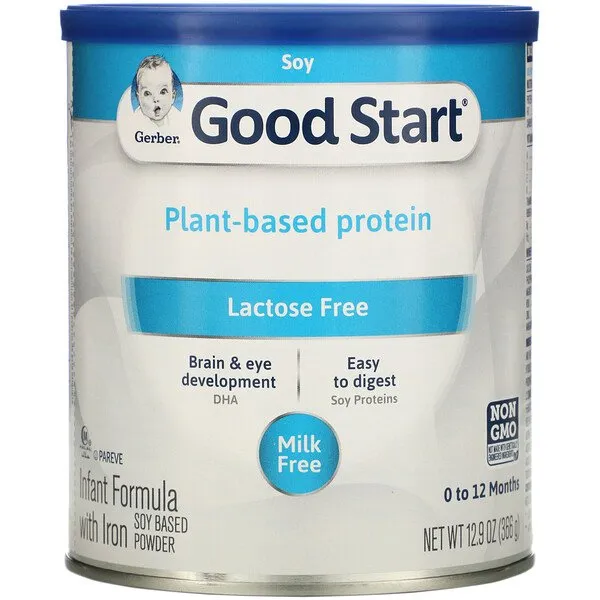
Gerber® Good Start® Soy provides comfort for babies with fussiness and gas due to milk or lactose intolerance while providing complete nutrition and plant-based protein.
- Easy to Digest Soy Proteins
- Non GMO
- Not Made with Genetically Engineered Ingredients
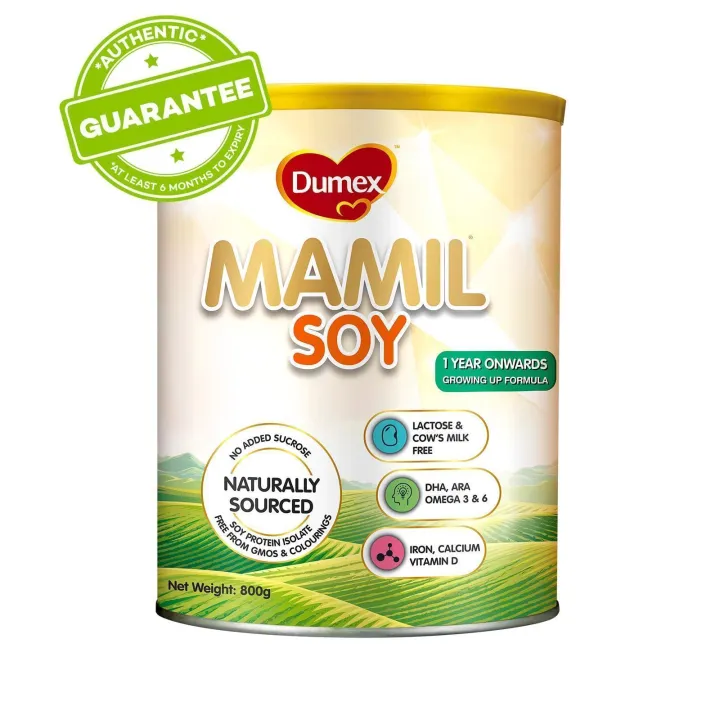
*Not suitable for infants with galactosaemia
Price on Lazada: SGD 44.60 > Buy on Lazada
4. Gerber, Good Start, Soy Based Powder Infant Formula with Iron, Lactose Free

Gerber® Good Start® Soy provides comfort for babies with fussiness and gas due to milk or lactose intolerance while providing complete nutrition and plant-based protein.
- Easy to Digest Soy Proteins
- Non GMO
- Not Made with Genetically Engineered Ingredients
Price on Lazada: SGD 48.90 > Buy on Lazada
B. Soy Milk Formula for 1 Year above
5. Dumex Mamil Gold Soy (1 Year Onwards) Baby Formula

A complete Soy growing-up formula to provide extra care for babies. It may be recommended by doctors during lactose intolerance and cow's milk protein sensitivity, use with medical supervision.
- Designed with PreciNutri System of nutrients to optimise the right nutrition in the right amount to meet your child's changing nutritional needs.
- Designed with PreciNutri System of nutrients to optimise the right nutrition in the right amount to meet your child's changing nutritional needs.
- High quality U.S.A Soy Protein Isolate that is free of cow's milk and lactose to support babies with special feeding needs.
- Contains 53mg DHA (per 100g) to support brain and eye development. 4) Contains prebiotics to support a healthy digestive system
- Contains 53mg DHA (per 100g) to support brain and eye development. 4) Contains prebiotics to support a healthy digestive system
Price on Lazada: SGD 43.60 > Buy on Lazada

Price on Lazada: SGD 49.54 > Buy on Lazada
Related Articles
FAQ
1. How often should I feed infant formula?
You can start by offering your baby 1 to 2 ounces of infant formula every 2 to 3 hours during their first days of life. This is if your baby is only getting infant formula and no breast milk. Give your baby more if he or she is showing signs of hunger.Most infant formula-fed newborns will feed 8 to 12 times in 24 hours. Talk with your child’s doctor or nurse about how much infant formula is right for your baby. (Source)
2. How do you know if your baby needs a different formula?
- Excessive Spit Up- Extra Fussiness Following Feedings
- Bloody Stool
- Severe Constipation
- Allergy Symptoms. They can show symptoms either immediately following feeding or up to 10 days later. For instance: eczema or skin rashes, loose stools (which may contain blood), vomiting or gagging, refusing bottles, wheezing, swelling, hives.
3. What formula is good for constipation and gas?
a. Protein Hydrolysate Formula
In all standard formulations, the protein is not processed at all. They’re exactly the same size as when they first came from the cow which may cause constipation in some babies.
Protein hydrolysate formulas are meant for babies who don't tolerate cow's milk or soy-based formulas.
This type of formula are nutritionally the same as standard formula milk, but it contains protein that's been broken down (hydrolyzed) — partially or extensively — into smaller sizes than are those in cow's milk.
Protein hydrolysate formulas are meant for babies who don't tolerate cow's milk or soy-based formulas.
This type of formula are nutritionally the same as standard formula milk, but it contains protein that's been broken down (hydrolyzed) — partially or extensively — into smaller sizes than are those in cow's milk.
b. A2 Milk Formula
Researchers believe that A2 is the more natural variant of beta casein. Some studies found that people who only drank milk from cows that produce A2 milk had less bloating and indigestion, leading some to believe that A2 milk is a healthier alternative to regular milk.
Goat Milk formula may be a better formula for children with constipation; this is because goat formula contains high levels of prebiotic oligosaccharides.
Moreover, It’s possible that goat milk is easier on the stomach. This is because goat milk has fewer micro-proteins than cow milk, which makes it easier for certain people to digest.
Parents can change their child’s formula from cow’s milk to goat’s milk, however, during the transition, your child may experience certain side effects. And if your children have just stopped breastfeeding and you choose to give them goat’s milk, best to do it under doctor’s supervision.
Parents can change their child’s formula from cow’s milk to goat’s milk, however, during the transition, your child may experience certain side effects. And if your children have just stopped breastfeeding and you choose to give them goat’s milk, best to do it under doctor’s supervision.
4. What are the causes of constipation in children?
Constipation may be caused by..
- Ignoring the urge to use the toilet
- Not eating enough fiber
- Not drinking enough fluids
- Switching to solid foods or from breast milk to formula (infants)
- Changes in situation, such as travel, starting school, or stressful events
Medical causes of constipation may include..
- Diseases of the bowel, such as those that affect the bowel muscles or nerves
- Other medical conditions that affect the bowel
- Use of certain medicines
5. What to do after your baby throws up
- Rest their stomach. Keep your baby from eating or drinking for 30 to 60 minutes after vomiting so that their stomach has time to recover.
- Give them fluids. after 3o minutes, start by giving your baby small amounts (0.5 oz or less) of fluid every 5 to 10 minutes. If your baby vomits the fluid out, wait another 30 minutes. Then start again with small amounts of fluid every 5 to 10 minutes. Use water, breast milk or a clear, noncarbonated liquid.
- Medicines. If your child has a fever, ask your pediatrician for the appropriate medication.
- Ignoring the urge to use the toilet
- Not eating enough fiber
- Not drinking enough fluids
- Switching to solid foods or from breast milk to formula (infants)
- Changes in situation, such as travel, starting school, or stressful events
Medical causes of constipation may include..
- Diseases of the bowel, such as those that affect the bowel muscles or nerves
- Other medical conditions that affect the bowel
- Use of certain medicines
- Rest their stomach. Keep your baby from eating or drinking for 30 to 60 minutes after vomiting so that their stomach has time to recover.
- Give them fluids. after 3o minutes, start by giving your baby small amounts (0.5 oz or less) of fluid every 5 to 10 minutes. If your baby vomits the fluid out, wait another 30 minutes. Then start again with small amounts of fluid every 5 to 10 minutes. Use water, breast milk or a clear, noncarbonated liquid.
- Medicines. If your child has a fever, ask your pediatrician for the appropriate medication.
6. Difference between Newborn vs Infant vs Toddler Formula
a. Difference Between Infant Formula and Stage 1 Formula Milk
- Infant formula resembles breast milk more
- Infant formula's only form of carbohydrate is lactose
- Stage 1 formula contains starch in addition to lactose
- Infant formula is usually watery, has less protein content, and is easier for babies to digest
- Stage 1 formula is creamier than infant milk and will keep your baby full longer
- Both formulas can be used from birth onwards.
- Both formulas can be used until the baby stops bottle feeding.
b. Difference Between Stage 1 and Stage 2 Formula Milk
- Stage 1 and Stage 2 formula milk have similar nutrients. The main difference is the ratio of casein and whey proteins, which are both derived from milk.
- Stage 1 formulas are whey dominant just like breast milk which has a whey to casein ratio of about 60:40. Whey digests quickly compared to casein.
- Stage 2 formulas are similar to Stage 1 formulas but has more casein, with a whey to casein ratio of 20:80. Casein digests slower, keeping babies full for longer.
- Stage 2 formulas are often creamier than Stage 1 formula and has more energy, making it more satiating for babies older than 6 months.
- Stage 2 formula is mainly appropriate when your child starts eating baby food. It can be used to supplement baby food if your baby is still hungry after drinking Stage 1 milk.
- Stage 2 formula can be used starting from month 7 (earliest) until the baby stops bottle feeding.
c. Difference Between Stage 2 and Stage 3 / Stage 4 Formula Milk
- Stage 3 formula usually has more starch and energy contents than Stage 2 formula, making babies full for longer.
- Stage 3 formula is usually not as micro and macronutrient dense as Stage 1 or Stage 2 formula milk, as it is considered as a weaning formula.
About Stage 3 Formula Milk
Stage 3 formula is appropriate for toddlers 12 months or older.
It shouldn't be used as a substitute for a healthy diet with fruits, vegetables, and proteins. This formula milk should be a part of your baby's diet, and shouldn't replace solid foods.
It may not be necessary for toddlers who are already eating a lot of healthy foods. However, if the child cannot consume enough normal food, stage 3 formula could be useful.
As always, consult a child specialist for specific nutrition advice.
All Milk Brands in Shopee Singapore
All Infant Formulas
All Milk Formulas for 1 Year Old and Above
Abbot Grow Milk Formula Singapore / Stages 1 - 5
Anmum / Materna for pregnant mums, Lacta for breastfeeding mums, Essential Stage 3 and 4 Toddler Formula
Bellamy's Milk Formula Singapore / Organic, Stage 1 to 4, Pregnancy Milk
Bubs Organic Milk Formula Singapore / Organic, Grass fed or goat milk options, Stage 1 to 3
Enfamil Milk Formula Singapore / Stage 1 and 2
- Gentlease for digestion problems / Post discharge for newborns
- Enfamil AR (anti regurgitation) for acid reflux and spit up
- Lactofree lactose free / Nutramigen hypoallergenic lactose free
Enfagrow Milk Formula Singapore / Stage 3 to Stage 5, Has Gentlease Option
Dutch Lady / 123, 456, Maxgro
Friso Milk Formula Singapore / Stage 1 to 4
- Comfort Next for constipation / AR thickened formula to reduce spit up
- HA hydrolyzed formula for cow's milk protein allergy / Has Frisomum pregnancy and lactation formula
Holle Milk Formula Singapore / Organic + Organic Goat Milk Option, Stage 1 to 3
HIPP Milk Formula Singapore / Organic, Combiotik option has prebiotics, Stage 1 to 4
Isomil Milk Formula Singapore / Soy Formula, Stage 1 and Stage 3
Karihome Milk Formula Singapore / Goat milk, Stage 1 to 4
Kendamil Milk Formula Singapore / Organic + Goat Milk Option, Stage 1 to 3
Lactogen Milk Formula Singapore / Stage 1 to 3
Nature One Dairy Milk Formula Singapore / Standard, Premium (More DHA, ARA, GOS, Lutein) and Organic Formulas, Stage 1 to 4, + Pregnancy formula
Nestle Nan / Optipro, Supremepro, HA (Hypoallergenic), Sensitive, Lactose free
Pediasure Milk Formula Singapore / For children 1-12 years old, Has sucrose free option
Wyeth S26 Milk Formula Singapore / Stage 1 to 4, Ascenda for growth (1 to 7 years old)
Similac Milk Formula Singapore / Total Comfort for sensitive stomachs, RS for anti regurgitation, Neosure for premature babies, Has organic option, Stage 1 to 4






Comments
Post a Comment